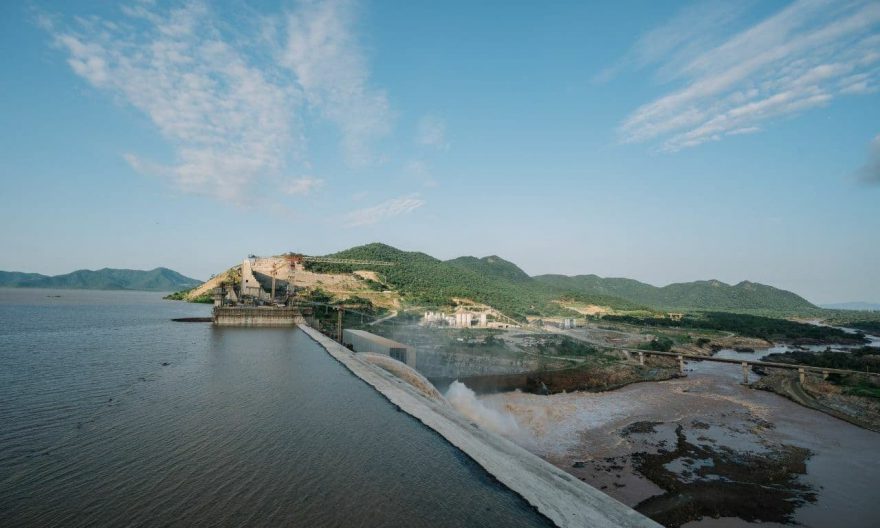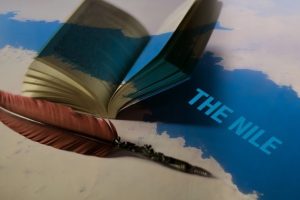
Part Two
Billions of dollars have been usurped by these political leaders and all those who were against the construction of the dam were happy observing that the project was not going anywhere. It was indeed just an excuse to shift attention from the problems people faced in their day to day life while continuing to raise funds for the pockets of corrupt politicians trading on the GERD and provoking false expectations!
It needed a real shift in the way the project was run and the current government made it one of its targets and priorities to begin again with the construction. Several shortcomings were observed and there were dangerous delays in all the activities that had to be carried out according to the schedule. Initially the project was intended to end in five to seven years; but with the way things were progressing, even twenty years would not have sufficed to guarantee the end of the project. It was a typically corrupt project used to drain the resources of people while never giving back.
This government took full control of the work and immediately begun to carry out not only the construction on the right path, correcting several mistakes and incapacities, but it also took away the contract from the incapable body that was entrusted to carry out the electrical work from the notorious Metec to a new company and a new movement around the dam began.
We have records that show that when the GERD was first planned, it was decades ago and it was noted that there were too many forces playing against such project of the country. Ever since imperial times the dam project on the Nile or Abay was in the programs of the government. Deep studies were carried out and plans were in the making. But the country was frustrated because it was too poor to engage in such massive project. It needed immense capital and equally big manpower to undertake it. It needed a program that would show to the world that Ethiopians needed a lot of power and using it build up industries. Ethiopians then were around twenty million but the need for development and growth was even more compelling than now as there was extreme poverty and people were not guaranteed of their daily livelihood, let along think of better housing, roads, hospitals, education etc.
People knew that Ethiopia was one of the poorest countries in the world and yet it had immense natural resources that could be exploited. It availed as vast arable land, it enjoyed adequate rainfall and it was owner of millions of cattle heads. But it lacked a democratic government that would mobilize the population and exploit duly the natural and human resources available. There were not enough educated people and it was times when the majority of African countries were under colonial rule.
When the emperor revealed his plans of building a dam along the Nile, the first immediate opposition came from downstream countries, particularly Egypt. They said the Nile was their property and that Ethiopia had no right to use any part of the water by harnessing it or building a dam on it. They argued it was for them a matter of survival and any attempt to build a dam on the river would be considered ‘an attack on the sovereignty of Egypt’. This statement was disseminated among the international community; so much so that all financial establishments were made to reject any attempt by Ethiopia to secure the necessary finance to build a dam on the Nile. Even its tributaries had to face the same destiny!
Sadly Ethiopians was to soon find out that not only was Ethiopia prohibited from building a dam on Abay but even any project on its tributaries was considered ‘red line’ It was of course one of the biggest injustices that were committed against Ethiopians who were deprived of their own natural resources only because Egypt was a country with huge political and diplomatic clouts and had influence in all international bodies! All of the west and the Arabian countries were evidently lined behind this Egyptian narrative! It was clear that the regional geopolitics presented Ethiopia as the sacrificial lamb for the politicians of Egypt, the Middle East and beyond.
It became an unwritten rule to deprive Ethiopia of any moves on the Abay. Sadly this state of affairs persisted for decades. Ethiopia continued to struggle in darkness and thirst despite owning a huge resource that is called Abay or Nile! The world seems to forget that more than eighty per cent of the Nile waters originate from Ethiopia and yet it was only Sudan and Egypt which were allowed to benefit from the blessing of the waters. Not only these countries benefited from the water but they also took full advantage of all the fertile soil the mighty river carried with it from the fertile highlands of Ethiopia eroding it for millennia! What is however disturbing and annoying is that they continued to justify this state of affairs making reference to old colonial pacts that they signed amongst themselves and their colonial masters, excluding conspicuously the main owner of the water: Ethiopia.
Egypt knows it contributes not even a drop of water to the Nile, Sudan realizes it has little to contribute; but Ethiopians see in front of their naked eyes as the water (in fact studies show that 85% of the Nile waters originate from Ethiopia) flows. And yet it is paradoxical and troubling to see Ethiopia being prohibited from using any drop of it! Some Egyptian politicians have the courage to face the world with a statement saying Egypt is the owner of the Nile because it cannot survive without it! This may be partially true but it cannot be stated that the claim as exclusive property owners over a resource that comes from another country is sustainable!
Ethiopia has repeatedly argued that it has no intention of harming downstream countries in the process of harnessing some of the water of the Nile. It has repeatedly promised that it intends to use the water and release it naturally without putting any hindrance to it. There is ample water that can bath not only Ethiopia but also all downstream countries. As a matter of principle and as a matter of justice, there can be no ways of prohibiting a country who owns a river from using it provided it takes into consideration the needs and livelihoods of downstream countries.
Several theories may be available on the way transboundary rivers are used and administered, but there cannot be any theory which prohibits the usage of the water by upstream countries . Egyptian hydrologists know everything they need to know about the GERD and in fact they have seen it as a real advantage for downstream countries in terms of limiting the damaging floods that come during the rainy season and they could benefit from the immense power that it generates at affordable prices.
Several studies have been carried out on the river and the dam and for the past ten years what has stood up has been the resistance of Egypt and Sudan on the way Ethiopia is about to use the river and they have been exerting every effort to try and have Ethiopia isolated from the international arena by accusing it of aggression against Egypt and Sudan.
The recent statement made by the Arab league that Egypt controls has been embarrassing because the intent was to sabotage the project. The insistence with which Egypt tried to make of the GERD as a security threat for the world and its pushing it as an agenda at the UN Security Council has only exposed its bad intentions on Ethiopia which instead of using a friendly and neighborly approach and reaching a compromise on how to run the dam, it wanted to continue with the old narratives of ownership or semi ownership of the water. This is of course a matter of sovereignty for Ethiopia and the government has been consistently clear on this issue. There is no way that Egypt or any other country for that matter can be part of the GERD or the Nile without the good will of Ethiopians. This is something that applies to any country which finds itself in similar condition. There are international legal frameworks that need to be developed and used between Ethiopians and other riparian countries and there cannot be impositions on Ethiopia just because it is perceived as a poor country.
The history of Ethiopia tells us glowingly that no nation that tries to impose its rule over Ethiopia will ever succeed because today Ethiopia is not alone. It has behind it the entire African continent. It has behind it all peace and justice loving people. In fact Egypt’s contiguous attempt to discredit Ethiopians in the international sphere has not succeeded at any stage. They tried to block the first filling of the dam. They failed miserably they tried to block the ‘second filling of the dam, they again failed and nature itself also failed it because unlike or contrary to what they had claimed there was enough rainfall to fill the dam as it stands at each stage.
History narrates that it was of course another world and another epoch and there were several injustices in the world carried out by colonial powers. Ethiopia was perhaps never pardoned for having violated the myth that the white army and white people were unbeatable. They were soundly beaten in a battle when Ethiopians defeated ‘white invading forces’ in Adwa in 1896 and other successive battles when alien forces tried to colonize Ethiopia. Ethiopians have repeatedly shown their patriotism and resolve and repelled all forms of invading forces with huge sacrifices. History books narrate that Egyptians have in the past repeatedly tried to ‘control the sources of the Nile’ to make it their private property, but Ethiopians have always counter attacked showing them that the integrity and sovereignty of Ethiopia was inviolable!
In modern days Ethiopia began again flirting with the idea of building a huge dam on the Abay because it determined that it was the only way forward to plan for the coming generations to come out of darkness and poverty, once and for all. Extensive and deep studies were carried out and the Grand Ethiopian Renaissance Dam was conceived and born.
In 2011 the foundation stone of the dam was put by the former Prime Minister Meles Zenawi and ever since that day there have been various incidents of threats and intimidations against a sovereign state. Egypt and Sudan as well as their allies and friends tried to undermine Ethiopians’ ambitions of building a dam on their own river accusing them of trying to strangle these two nations. It was of course false accusations and the real purpose of their argument was to keep Ethiopians in dire poverty and never be a regional powerhouse with what could be attained by developing the immense riches of Abay.
The myth that Abay or Nile was created for Egyptians only was dismantled by Ethiopia’s extensive diplomatic battles carried out everywhere in the world wherever there were fora for such presentations. Egypt’s hegemony over a river that actually belonged to Ethiopia was to end. Ethiopians presented their case before every imaginable forum that they have been unjustly deprived of the possibility of developing their river and using the water for drinking, energy and other development activities.
The arguments that Egyptian politicians and those of Sudan have always made the Nile water’s usage a matter of their survival was largely a political game rather than true reality on the ground and Ethiopia has had to exert extra effort to discredit these claims and assertions. Their attempts to block the construction and later on to fill the water all failed because Ethiopians have shown to the world that their efforts were meant only to benefit them without inflicting any damage to downstream countries. In the end justice has triumphed and progress on the GERD project is being recorded every day. The inevitability of the completion of this project may bring back those who opposed it to their senses and may be to be part of the benefits. Ethiopians need to be congratulated on this immense achievement. In the end GERD will prove to be a cornerstone for regional integration and long lasting cooperation.
BY FITSUM GETACHEW
The Ethiopian Herald 29 July 2021





